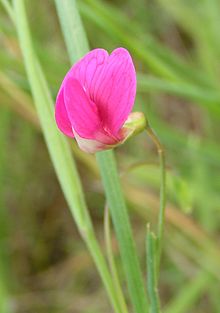| Lathyrus | |
|---|---|

| |
| Grass vetchling (Lathyrus nissolia) | |
| Scientific classification | |
| Kingdom: | Plantae |
| Clade: | Tracheophytes |
| Clade: | Angiosperms |
| Clade: | Eudicots |
| Clade: | Rosids |
| Order: | Fabales |
| Family: | Fabaceae |
| Subfamily: | Faboideae |
| Clade: | Inverted repeat-lacking clade |
| Tribe: | Fabeae |
| Genus: | Lathyrus L. (1753), nom. cons.[1] |
| Species[2] | |
|
181; see text | |
| Synonyms[2] | |
| |
Lathyrus /ˈlæθɪrəs/[3] is a genus of flowering plants in the legume family Fabaceae, and contains approximately 160 species. Commonly known as peavines or vetchlings,[1] they are native to temperate areas, with a breakdown of 52 species in Europe, 30 species in North America, 78 in Asia, 24 in tropical East Africa, and 24 in temperate South America.[4] There are annual and perennial species which may be climbing or bushy. This genus has numerous sections, including Orobus, which was once a separate genus.[5] The genus has numerous synonyms, including Pisum, the ancient Latin name for the pea.[6]
- ^ a b "genus Lathyrus". Germplasm Resources Information Network (GRIN) online database. Retrieved 10 March 2017.
- ^ a b Lathyrus L. Plants of the World Online. Retrieved 9 August 2023.
- ^ Sunset Western Garden Book, 1995:606–607
- ^ Asmussen, C. B; A. Liston. (March 1998). "Chloroplast DNA characters, phylogeny, and classification of Lathyrus (Fabaceae)". American Journal of Botany. 85 (3): 387–401. doi:10.2307/2446332. JSTOR 2446332. PMID 21684923.
- ^ Fred, Edwin Broun; Baldwin, Ira Lawrence; McCoy, Elizabeth (1932). Root Nodule Bacteria and Leguminous Plants. UW-Madison Libraries Parallel Press. p. 142. ISBN 978-1-893311-28-2.
- ^ Gledhill, David (2008). "The Names of Plants". Cambridge University Press. ISBN 9780521866453 (hardback), ISBN 9780521685535 (paperback). pp 304